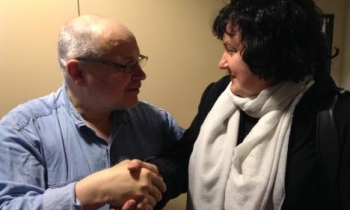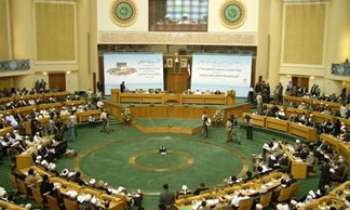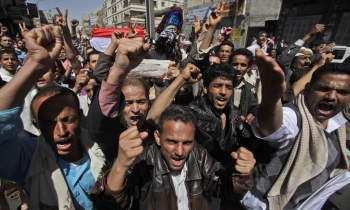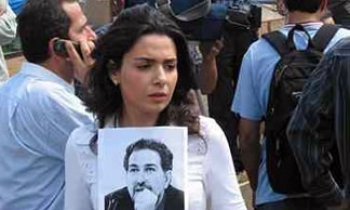BOGOTA, (IPS) - They live in such fear that they dare not venture beyond the city limits. The death threats are periodically renewed, just in case it occurs to any of them that the danger has disappeared. They are reporters in the midst of Colombia's four-decade civil war.
After they were targeted by collective threats in 2003, 16 journalists with the leading publications in the eastern oil-rich province of Arauca, on the border with Venezuela, were included by the government in a special protection programme and taken to Bogotá at the urging of the Colombian Foundation for Press Freedom (FLIP).
The government programme for the protection of journalists provided them with financial support for three months. Shortly after the support dried up, 12 of them returned to Arauca, where they had left their families behind.
The government then assigned them two vans, protected by two bodyguards each, for transportation, which meant that the reporters had to resign themselves to never obtaining exclusives.
"We have to go out and get the news in groups," Ángel María León, president of the Arauca Journalists' Association and a correspondent with the Bogotá daily El Tiempo, said in a press conference in the capital. "It is very difficult for us to get used to going about in a single vehicle carrying up to eight reporters."
Arauca is a conflict zone where the leftist guerrilla groups - the Revolutionary Armed Forces of Colombia (FARC) and the smaller National Liberation Army (ELN) - face off with the extreme-rightwing paramilitaries and the armed forces.
Also active in the area is a special army brigade equipped, trained and financed by Washington to guard the Caño Limón-Coveñas pipeline that carries oil pumped by the California-based Occidental Petroleum from Arauca to the Caribbean coast in northwestern Colombia. The pipeline is one of the ELN's favourite targets.
Also taking part in the news briefing were reporters from the northwestern province of Sucre, large parts of which are under paramilitary control; Buenaventura, the main port on the Pacific Ocean and the focus of a turf war between the irregular forces; and Florencia, the capital of the southern province of Caquetá, where the U.S.-financed Plan Patriot, which includes military training from the United States, is being implemented.
The press conference was organised Saturday by the New York-based Committee for the Protection of Journalists (CPJ) to present the special report, "Untold Stories: Threatened on all sides, Colombia's news media muzzle themselves".
The report, written by U.S. journalist Chip Mitchell - who has been based in Colombia for the past two years - with contributions from the CPJ's Frank Smyth, describes the conditions faced by reporters in war-torn regions of Colombia.
"There are issues that are off-limits for us," said León, who admitted that reporters have to censor themselves. "The news must be reported only up to a certain point. We can't provide complete coverage, sadly."
"Interviews with three dozen news professionals show that media outlets and journalists across the country routinely censor themselves in fear of physical retaliation from all sides in the nation's conflict," says the CPJ report.
"At least 30 Colombian journalists have been murdered over the past decade for their work," it adds.
In Arauca, two soldiers were convicted for the 1991 murder of El Tiempo correspondent Henry Rojas.
The Defence Ministry was ordered to pay compensation to the reporter's family. But in August, a national panel of administrative judges known as the State Council stated that the case evidence files, which weighed 50 kilos, had gone missing and would have to be reconstructed.
Efraín Varela, a reporter with the Meridiano 70 radio station, was killed in 2002. "His murder meant that we all stopped carrying out investigative journalism in Arauca, and that questions like corruption have become topics we can't touch," said León, who added that politicians cannot be investigated either.
The reporter who had replaced Varela in the radio station, Luis Eduardo Alfonso, was slain in March 2003.
The collective death threat arrived nine days after his death.
The threats against journalists have not let up in Arauca. "The fact that we don't make them public doesn't mean we haven't continued to receive threats," said León.
The CPJ also said the self-censorship in Colombia "has international dimensions."
The government of rightwing President Álvaro Uribe "is pushing for U.S. and European funding of a $130 million plan to reintegrate the demobilised paramilitaries into society. But foreign taxpayers can hardly judge whether the plan might bring peace if the press doesn't dare investigate drug trafficking by paramilitaries or their civilian attacks," says the report.
The CPJ acknowledges that "the Colombian government exerts little control over news content." It adds, however, that "officials encourage self-censorship.by accusing journalists of guerrilla ties."
"The U.S. State Department has reported on a score of separate cases in which the attorney general has taken little or no action in response to the disappearances or deaths of lawyers, union leaders, journalists, and other prominent figures," the report adds.
"The city is our jail, even though we have no problems with the justice system," said León. "We can't go outside of the city limits to cover the news.it's really tough to gather the news."
"To avoid just 'swallowing whole' the information supplied by security bodies and official agencies, we call the municipal governments and get information from spokespersons, police inspectors and social organisations," he explained.
He also said that in Arauca, "Reporting on social organisations or trade unions is practically a crime. It also stigmatises the journalist."
"We only go to military garrisons when they invite us to a press conference, otherwise we can't go. If we need to get information, we have to call the general or the police commander by phone, so that we are not seen frequently visiting the military installations, because that would increase the risks we face," he added, pointing out that "the city of Arauca is riddled with FARC and ELN militia members."
The province of Arauca was subjected to a 23-day "armed strike" imposed by the rebels, which ended last Friday. One journalist was warned by the ELN not to use the word 'sicario' (killer) to refer to guerrillas who commit murders.
The Uribe administration announced penalties last week for public transport companies whose vehicles failed to circulate during the armed strike.
According to León, the guerrillas lifted the strike, not due to government pressure, "but because they decided that enough was enough.and had realised that people were starting to suffer from hunger, because the seven municipalities (in which the province is divided) had run out of supplies."
"They called off the strike after leaving us without electricity for eight days, toppling nine electricity pylons, burning seven vehicles, killing three police officers and a taxi driver, and blowing up bridges. They made their strength felt."
The insurgents "even brought transportation across the border in Venezuela to a halt, because to drive from Arauca to Cúcuta (the main Colombian city near the border, to the northeast), we use Venezuelan highways," he said. . León commented to IPS that he had no doubt that the guerrillas were in Venezuelan territory, between 10 and 30 kilometres from the border, during the armed strike. He added that their presence did not elicit any reaction from the Venezuelan government.
"They said they also gave the orders on the other side (of the border), and that they would not allow vans carrying merchandise into Arauca. All of the highways were blocked," said the journalist.
He also stated that the local civilian and military authorities had lied to President Uribe with respect to the real balance of forces in the region, and that he did not attend a security council meeting Saturday to which he was invited by the president's office "Because it's really difficult if the president asks you how the situation is, that you have to lie, out of fear of reprisals, since all of the authorities are there."
"So I preferred to come here. I feel much more comfortable here than in a security council with the president," said the head of the Arauca Journalists' Association.









